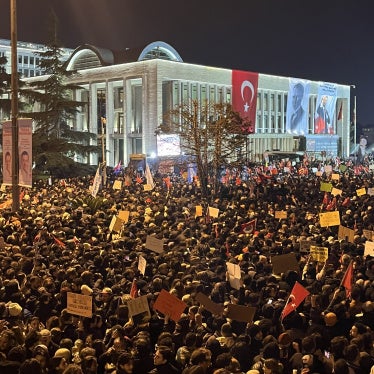We are writing today to ask for your support on behalf of Annadurdy Khajiev, a Turkmen refugee who was granted humanitarian status in Bulgaria in 2004 and who is currently at risk of extradition to Turkmenistan. We strongly believe that this case needs your urgent attention and intervention and that because of Germany’s presidency of the European Union you are well-positioned to raise this case with the Bulgarian government.
Mr. Khajiev was detained on February 19, in Varna pursuant to a request made by the government of Turkmenistan for his extradition. We are convinced that if returned to Turkmenistan Mr. Khajiev would face persecution due to his political affiliations and would face an almost certain risk of torture or other ill-treatment in custody. We urge you to call upon the Bulgarian government to adhere to its international human rights commitments and decline the extradition request for Mr. Khajiev. We also urge you to call for the immediate release of Mr. Khajiev.
On February 19, 2007, Varna police detained Mr. Khajiev without a warrant for 24 hours as he was renewing his humanitarian status document (card of subsidiary protection beneficiary) at Varna District Department of the Interior. Police released Mr. Khajiev on February 20 at 10.15 a.m., when the 24-hour limit expired for detention without warrant. He was ordered to appear at the Varna Supreme District Court at 1.30 p.m. that same day, when an arrest warrant was expected to arrive from Sofia. As requested, Mr. Khajiev returned at the specified time and was detained for another 72 hours; only three hours after Mr. Khajiev was arrested his lawyer received a copy of the arrest warrant issued by the Supreme Cassation Procuracy of Bulgaria ordering Mr. Khajiev’s arrest for 72 hours and requesting a court order to detain him for up to 40 days in order to prevent him from fleeing justice. On February 22, 2007, the Varna District Court approved the procuracy’s request to extend Mr. Khajiev’s detention. This decision was upheld by the Varna Appeals Court on February 27.
On March 14, Mr. Khajiev’s lawyer filed a motion with the Varna District Court seeking Mr. Khajiev’s release based on article 16 of the European Convention on Extradition, which provides that provisional arrest may be terminated if, within a period of 18 days after arrest, the requested Party has not received the request for extradition and the documents supporting such a request. The Judge Shopova of the Varna District Court ruled on March 21 that Mr. Khajiev should remain in detention. This decision was upheld by the Varna Appeals Court on March 27.
We believe that there are no legitimate grounds to keep Mr. Khajiev in custody while the court considers the extradition request. We are not aware of any evidence demonstrating that Mr. Khajiev is a flight risk or would obstruct justice. To the contrary, Mr. Khajiev voluntarily submitted to arrest on February 20 and previously on December 4, 2002, the first time Bulgaria considered an extradition request for Mr. Khajiev. We regard Mr. Khajiev’s detention as a disproportionate measure and urge you to call upon the Bulgarian authorities to release Mr. Khajiev immediately.
In 2002 Turkmenistan requested that Bulgaria extradite Mr. Khajiev, claiming he was involved in the theft of about US $41 million from the Central Bank of Turkmenistan, where he served from 1992-1998 as deputy chairman. On May 23, 2003, the Varna District Court rejected the extradition request on the grounds that there was reason to believe the charges were politically motivated. The Court concluded that “the criminal prosecution against Khajiev is for political reasons, due to his political beliefs and his involvement in the opposition against the official government of Turkmenistan.” Even though the current extradition request is based on the same charges as in 2002, Judge Shopova refused to take into consideration the conclusion reached by the Court in 2003.
We are convinced that since 2003 the situation in Turkmenistan has not changed in any meaningful way that would reduce the risk of persecution and mistreatment Mr. Khajiev would face if extradited to Turkmenistan. We are also convinced that he would be prosecuted in retribution for his political affiliations and activities and would not receive a fair trial before an impartial court. Turkmenistan remains one of the most repressive states in the world that brutally suppresses any dissent and where torture of detainees is a widespread problem.
The new president of Turkmenistan, Gurbanguly Berdymukhammedov, who came to office through the February 11 pro forma election following the death of Turkmenistan’s president-for-life Saparmurad Niazov, has given no indication whatsoever that he would end severe human rights violations that characterized the Niazov era.
We believe that Mr. Khajiev, a member of the opposition movement Watan, has a well-founded fear of persecution in Turkmenistan for his political opinion. This assessment is based both on the government’s overall record and on persecution that his family members in Turkmenistan have endured in retribution for Mr. Khajiev’s political affiliations and for the human rights work of his wife, Tajigul Begmedova. Ms. Begmedova is head of the Turkmenistan Helsinki Foundation for Human Rights, a Bulgaria-based human rights group that monitors and reports on human rights conditions in Turkmenistan.
In August 2006, Mr. Khajiev’s sister Ogulsupar Muradova, a journalist and affiliate of the Turkmenistan Helsinki Human Rights Foundation, was convicted along with his brother, Sapardurdy Khajiev, and Annakurban Amanklychev, on politically motivated charges of illegal weapons possession. All three were associated with the Turkmenistan Helsinki Foundation for Human Rights. Muradova died in custody under suspicious circumstances several weeks after the trial. Security agents harassed and threatened Muradova’s adult children following her death. The threats included specific references to the activities of Muradovas’ aunt and uncle in Bulgaria.
Several other close relatives of Mr. Khajiev —two brothers as well as his brother-in-law and sister-in-law—have been in custody since 2002, when they were arrested and sentenced to lengthy prison terms. On August 31, 2003, Mr. Khajiev’s elderly father-in-law, Sazak Begmedov, was seized by agents of the Ministry of Internal Affairs, beaten, and forced into internal exile in Dashauz, a remote area of Turkmenistan near the border with Uzbekistan.
Ill-treatment and torture by law enforcement and security agencies in Turkmenistan is routine. Local activists continue to make credible allegations of vicious beatings and other forms of torture used to coerce confessions and intimidate defendants and witnesses. Methods include suffocation with plastic bags, beatings with batons, food and sleep deprivation, and injection of unknown narcotics.
Because Mr. Khajiev faces a credible threat of almost certain ill-treatment or torture, his extradition would violate Bulgaria’s obligations under international law.
Article 3 of the European Convention for the Protection of Human Rights and Fundamental Freedoms (ECHR) prohibits inhuman treatment and torture including the return, expulsion, deportation or extradition of any person to a country where he or she would face a real risk of exposure to such treatment.
Article 3 of the 1984 Convention against Torture and Other Cruel, Inhuman or Degrading Treatment or Punishment also imposes an obligation not to return a person to any place where he or she is in danger of being subjected to torture. Khajiev’s extradition would also violate the 1951 Refugee Convention, which bans the return of refugees and asylum seekers to countries where they face persecution (refoulement).
We hope that you will raise this case with the Bulgarian government, and specifically request that Mr. Khajiev be released immediately and that Turkmenistan’s extradition request be rejected. Should you require further information about the human rights situation in Turkmenistan, please do not hesitate to contact our organizations.
Thank you for your attention to this urgent letter.
Sincerely,
Holly Cartner
Executive Director, Europe and Central Asia division
Human Rights Watch
Aaron Rhodes
Executive Director
International Helsinki Federation for Human Rights
Farid Tukhbatullin
Chairman
Turkmenistan Initiative
Robert Ménard
Secretary General
Reporters Without Borders
Krassimir Kanev
Chairman
Bulgarian Helsinki Committee
CC:
Georgi Parvanov, President of Bulgaria
Ivan Georgiev Kalfin, Minister of Foreign Affairs of Bulgaria








